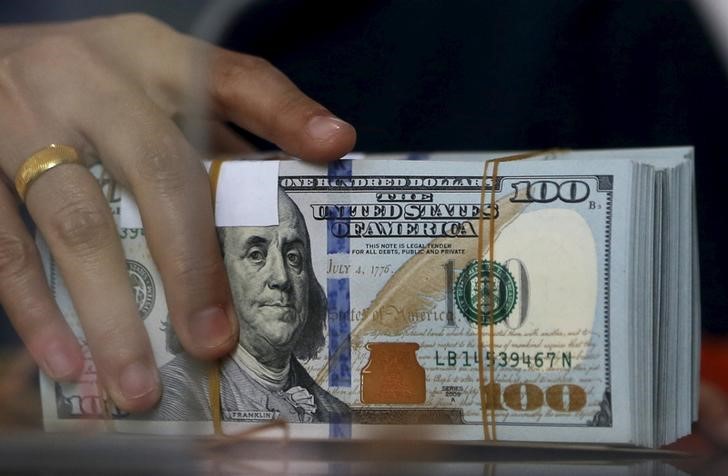By Marc Jones
LONDON (Reuters) - The dollar fell to its lowest since August after weak U.S. data and company results, while a two-month high for Asian indexes helped world shares bounce back from two days of losses.
Having obsessed for months about when U.S. interest rates will start to rise, traders began thinking that maybe, just maybe, they might have to fall again, given limp U.S. retail sales, the biggest producer prices falls in eight months and a $22 billion hammering for the world's biggest retailer Wal-Mart (N)
The dollar had dropped like a stone overnight, testing $1.15 per euro <EUR=> and slicing down to 118.10 yen <JPY=>. [FRX/]
It found some support as European Central Bank policymaker Ewald Nowotny said that it was "quite obvious that additional sets of instruments are necessary" to bring euro zone inflation back towards percent.
"Markets are pricing out a Fed rate hike and the dollar is crashing," said Aurelija Augulyte, a senior FX strategist at Nordea in Helsinki.
"If you look at the very recent U.S. data there are signs of worry... If China doesn't recover and if the European data doesn't improve either there is a fair chance we could discuss further (Fed) easing," she added.
European shares snapped a three-day slide on the prospects of more central bank support. The regional FTSEurofirst 300 (FTEU3) rose 1 percent after Asian bourses, also hoping for stimulus from China and Japan, hit their highest since mid-August.
MSCI's broadest index of Asia-Pacific shares outside Japan (MIAPJ0000PUS) rose 2 percent as Shanghai shares (SSEC) advanced 2.3 percent, Australian shares (AXJO) nudged up 0.6 percent and South Korea's Kospi (KS11) climbed 1.1 percent.
Japan's Nikkei (N225) gained 1.15 percent, as the second successive fall in manufacturers' sentiment kept pressure on policymakers to do more.
"There seem to be considerable expectations of further economic stimulus, which could mitigate some of the deflationary pressures," said Gerry Alfonso, analyst at Shenwan Hongyuan Securities.
EMERGING RELIEF
Expectations of a long delay to rate hikes boosted U.S. Treasuries, taking the benchmark 10-year note yield (US10YT=RR) as low of 1.9690 percent.
In Europe, German Bund yields <DE10YT=TWEB> reached their lowest in two weeks as Nowotny raised hopes of more ECB bond buying. [GVD/EUR]
European Central Bank Vice President Vitor Constancio said a rate hike by the Fed could have greater global repercussions than in the past because the economy has changed and central banks have little experience of moving away from zero interest rates.
But the chances of a Fed hike any time soon have all but evaporated follow a month-long run of disappointing U.S. data.
On Wall Street, the Dow (DJI) lost 0.9 percent and the S&P 500 (SPX) shed 0.5 percent overnight after a weak profit forecast from the shopping giant Wal-Mart's (N:WMT) triggered its biggest share price fall since 1998. (N)
Goldman Sachs (N:GS), Citi and Philip Morris are all due to report third quarter results later along with another dump of economic data. (N) Wall Street's main markets are expected to start 0.6-0.8 percent higher. (ESc1)
Among commodities, oil struggled amid lingering concerns of a global supply glut and as the dollar started to stabilize [O/R]. Industrial metals got a fresh lift with copper near a 4-week high and gold <XAU=> reaching a 3-1/2 month peak.
Emerging Asian currencies made the most of the earlier dollar weakness. The Indonesian rupiah <IDR=> hit its strongest in more than four months, South Korea's won <KRW=KFTC> touched a three-month peak and Malaysia's ringgit <MYR=MY> jumped more than 1 percent.

"We are seeing continuous unwinding of bearish bets on emerging currencies generally, as views of 'no U.S. hike this year' are growing," said Seungji Jeon, Samsung (KS:005930) Futures' FX analyst in Seoul.